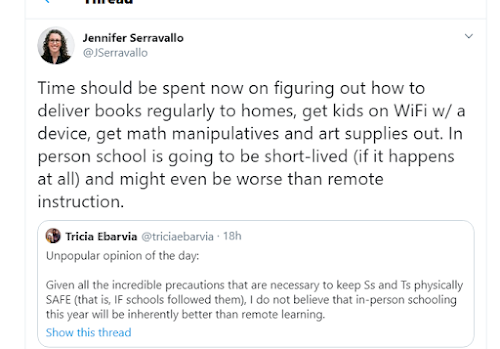We need to get books into our student's homes and hands.

This tweet from the estimable Jennifer Serravallo appeared on my feed this morning. I believe she is right. Schools should not be forced to re-open and the likelihood that a forced re-opening will lead quickly to a renewed shutdown is high. Districts, school leaders and teachers should be preparing for more long-term distance learning. This situation, we know, is not ideal, but as my mother would say, if all you have is chopped meat, make meatloaf. In this case, if we can't meet with our students eye to eye, lets' make independent reading a priority. The one thing that the pandemic gives us is time. The one thing that all research shows is that time spent reading is the best way to improve reading. So we have a potentially winning formula in front of us. How do we make it happen?
- Get Books in Children's Hands - Schools need to be working out ways to deliver books to children's homes so they have material to read. My daughter and son-in-law volunteered this spring to deliver lawn signs for graduates of the local high school. Schools need to similarly organize to get the books to the children.
- Make Sure All Children Get WIFI Access - Online communication will be critical. Some school districts are sending out school busses to accomplish this in areas where WIFI availability is spotty for children. Forging partnerships with local providers can be another way to get necessary connectivity to students.
- Offer Choice Reading - Teachers can communicate to students about what reading material is available and have kids request books that they are interested in reading. If the books can be made available electronically fine, if not, deliveries are scheduled through parent volunteers.
- Get Book Clubs Going - Facilitate students who wish to read the same book to form ZOOM book clubs to discuss their reading. Teachers could provide recommendations for discussion questions or interact with students in the book clubs.
- Focus on Interest Rather than Accountability - Rather than attempting to record, assess, or quiz students on their reading, focus on interest and open ended questioning that encourages talk about the reading and explortion of ideas, rather than compliance. Combining elements of choice, interest, and discussion may be the best way to actually encourage time on task.
- Enlist Parental Help - Some parents may be able to help with book distribution, but most importantly schools need to communicate to parents guidelines on how they can help their children in a program of independent reading and book clubs. Providing parents with guidelines for talking to their children about books would also be helpful.
This is a new and strange world. Books offer comfort, entertainment, and information. Spending time reading improves reading ability. Rather than lamenting the shortcomings of online learning or trying to make it do something it simply cannot do, let's try to embrace the gift of time we are given and work on developing the reading habit.

No comments:
Post a Comment